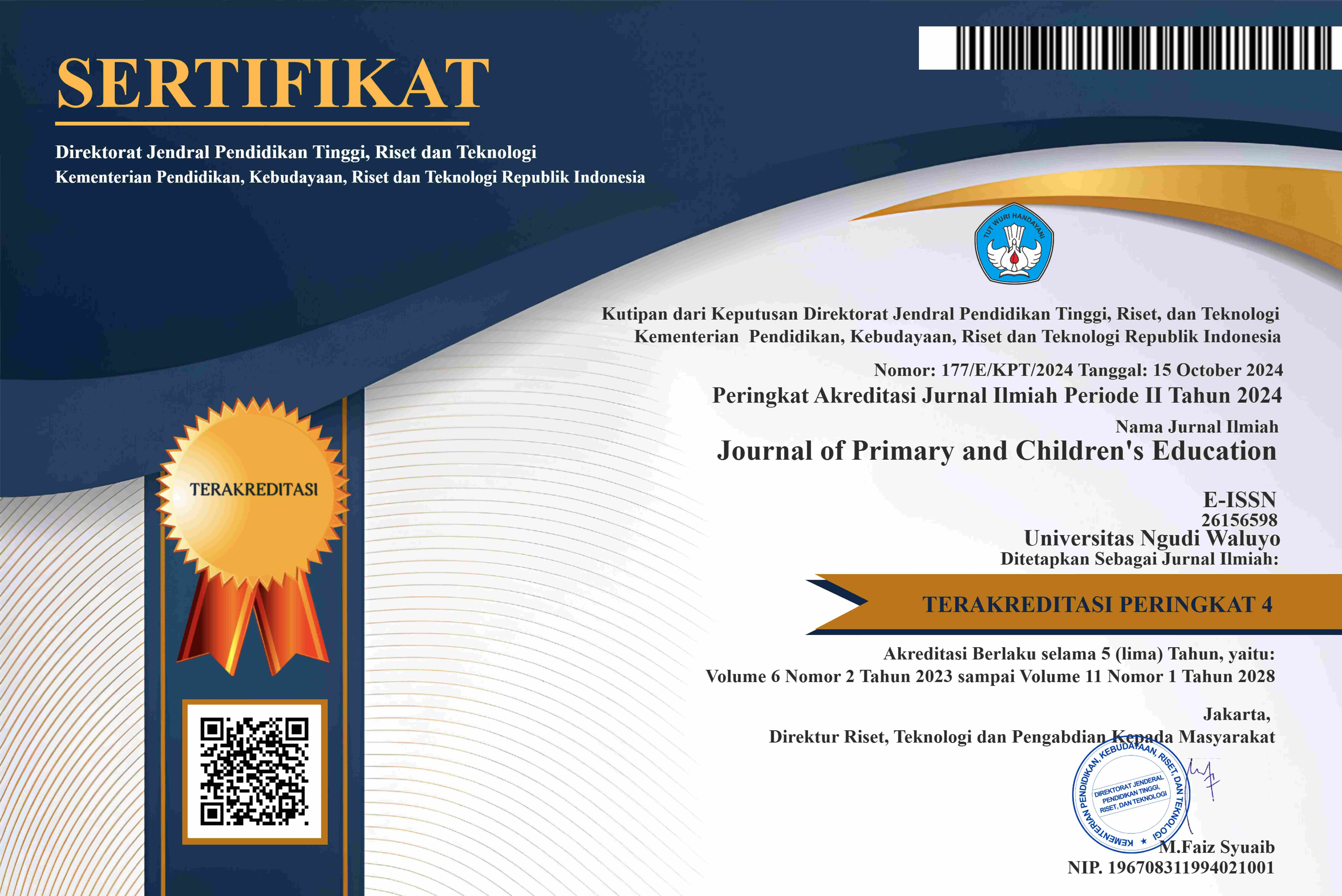Efektivitas Pembelajaran Tema Selalu Berhemat Energi Bermuatan Sustainability Menggunakan Model Problem Based Learning Terhadap Pemahaman Konsep
DOI:
https://doi.org/10.35473/jnctt.v6i1.2266Keywords:
Sustainability; Problem Based Learning Models; Understanding Concepts; Thematic Learning.Abstract
The aim of the study was to test the effectiveness of the problem-based learning model with sustainability on the conceptual understanding of fourth grade students at SD Negeri 01 Protomulyo. The research carried out was of a quantitative type using an experimental method in the form of a One-Group Pretest – Posttest Design used in one group. The results obtained from the research show that student learning outcomes have increased compared to the results of the pretest and posttest, so that it can be concluded that the problem based learning model contains sustainability is effective on science learning outcomes for fourth grade students at SD N 01 Protomulyo. Based on the results of this study, suggestions can be given so that teachers can implement problem-based learning models with sustainability in order to create effective and enjoyable learning for students.
Tujuan penelitian ialah untuk menguji keefektifan model problem based learning bermuatan sustainability terhadap pemahaman konsep siswa kelas IV SD Negeri 01 Protomulyo. Penelitian yang dilaksanakan berjenis kuantitatif dengan menggunakan metode eksperimen berbentuk One-Group Pretest–Posttest Design yang digunakan pada satu kelompok. Hasil yang didapat dari penelitian menampilkan bahwasanya hasil belajar siswa meningkat dibandingkan hasil pretest dan posttest, sehingga dapat diambil simpulan bahwasanya model Problem Based Learning bermuatan sustainability efektif terhadap hasil belajar IPA siswa kelas IV SD N 01 Protomulyo. Berdasar hasil penelitian ini, dapat diberikan saran agar guru bisa mengimplementasikan model Problem Based Learning bermuatan sustainability agar tercipta pembelajaran efektif serta menyenangkan untuk siswa.
References
Agustina, D. M., & Purwanti, K. Y. (2022). Keefektifan PBL Berbantuan Fun Thinkers Book Terhadap Kemampuan Berpikir Kreatif Siswa 3 Sekolah Dasar. JANACITTA : Journal of Primary and Children’s Education, 5(024), 47–55.
Amalia, F. (2020). Pengaruh Model Problembased Learning (Pbl) Berbasisetnosains Pada Mata Pelajaran Ipa Terhadap Hasil Belajar Siswa Kelas Iv Tema 3 Sdn Candirejo 01 Kab. Semarang. 21(1), 1–9.
Berpikir, K., Siswa, K., & Sekolah, D. I. (2014). Model Problem Based Learning Untuk Menumbuhkan Kemampuan Berpikir Kritis Siswa Di Sekolah Dasar Oleh : Ryky Mandar Sary, Djariyo, Ihtiya Kusuma Dewi Universitas PGRI Semarang.
Diningtyas, F. P., Reffiane, F., Based, P., & Based, P. (2021). Inventa : Jurnal Pendidikan Guru Sekolah Dasar Pengembangan Perangkat Pembelajaran Berbasis Model Pendahuluan Pendidikan merupakan suatu proses. V(2), 237–249.
Habiba, R., Nurwahyunani, A., & Biologi, S. P. (2017). Pengaruh Pembelajaran Materi Sistem Regulasi Berbantu Media Flashcard Bermuatan Sustainability terhadap Keterampilan Proses Sains dan Hasil Belajar Kognitif di SMA. 369–375.
Indah Wijayanti, Rais, R., & Azizah, M. (2021). Keefektifan Model Problem Based Learning Berbantu Media Diorama Terhadap Hasil Belajar Ipa Kelas V Sdn 02 Pesucen. Didaktik : Jurnal Ilmiah PGSD STKIP Subang, 6(2), 286–295.
Lestari, F. I., Studi, P., & Biologi, P. (2019). Efektif Penggunaan Pewarna Alami Batik pada Pembelajaran Materi Angiospermae Bermuatan Sustainability terhadap Hasil Belajar Kognitif Siswa di SMP. 23–30.
Lubis, maulana arafat. (2020). Pembelajaran Tematik SD/MI. Prenada Media.
Melathi, D. R., & Putra, L. V. (2022). Pengaruh Model Problem Based Learning Berbantuan Permainan Monopoli Terhadap Kemampuan Pemecahan Masalah Siswa. JANACITTA : Journal of Primary and Children’s Education, 5(024), 39–46.
Niki, M. R., Theodora Maasawet, E., & Susilo, S. (2019). Pengembangan Perangkat Pembelajaran Model Problem Based Instruction (PBI) Terhadap Hasil Belajar Siswa dan Kemampuan Menulis Laporan Ilmiah. Biodik, 5(2), 96–108.
Novianti, A., Bentri, A., & Zikri, A. (2020). Pengaruh Penerapan Model Problem Based Learning (Pbl) Terhadap Aktivitas Dan Hasil Belajar Siswa Pada Pembelajaran Tematik Terpadu Di Sekolah Dasar. Jurnal Basicedu, 4(1), 194–202.
Nuralita, A., & Reffiane, F. (2020). Keefektifan Model PBL Berbasis Etnosains Terhadap Hasil Belajar. 8(3), 457–467.
Patonah, S. (2022). Science Technology Learning Cycle (Stlc) Learning Model in Virtual Class.
Safitri, F. N., Reffiane, F., & Subekti, E. E. (2020). Model Problem Based Learning ( PBL ) Berbasis Etnomatematika pada Materi Geometri Terhadap Hasil Belajar Siswa. 8(3), 492–498.
Shoimin, A. (2017). 68 model pembelajaran inovatif dalam kurikulum 2013. Ar-Ruzz Media.
Sugiyono. (2018). Metode Penelitian kuantitatif, kualitatif dan R & D. Alfabeta.
Suprastowo, P. (2010). Kebijakan dan Implementasi Pendidikan untuk Pembangunan Berkelanjutan (Education for Sustainable Development/ESD). Jurnal Penelitian Kebijakan Pendidikan.
Downloads
Published
How to Cite
Issue
Section
License
Copyright notice:
- Authors retain copyright and grant the journal right of first publication with the work simultaneously licensed under Creative Commons Attribution License that allows others to share the work with an acknowledgement of the work's authorship and initial publication in this journal.
- Authors are able to enter into separate, additional contractual arrangements for the non-exclusive distribution of the journal's published version of the work (e.g., post it to an institutional repository or publish it in a book), with an acknowledgement of its initial publication in this journal.
- Authors are permitted and encouraged to post their work online (e.g., in institutional repositories or on their website) prior to and during the submission process, as it can lead to productive exchanges, as well as earlier and greater citation of published work (The Effect of Open Access)







